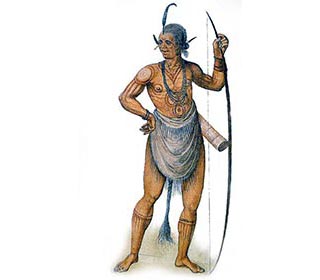The names of the North Carolina tribes included the Algonquian, Bear River Indians, Cape Fear Indians, Catawba, Cheraw, Cherokee, Chowanoc, Machapunga, Moratok, Natchez, Occaneechi, Saponi, Shakori, Tuscarora and Waccamaw tribes. History of North Carolina Indians - The French Indian Wars
The French and Indian Wars (1688 - 1763) was a generic names for a series of wars, battles and conflicts involving the French colonies in Canada and Louisiana and the 13 British colonies, which included North Carolina, consisting of King William's War (1688-1699), Queen Anne's War (1702-1713), King George's War (1744 - 1748) and the French and Indian War aka the Seven Years War (1754-1763). Various North Carolina Indian tribes were allied to the French and British colonies during the French Indian Wars which raged for nearly 75 years. Fast Facts about the History of North Carolina Indians
The climate, land, history, environment and natural resources that were available to the indigenous Indian tribes in North Carolina resulted in the adoption of the Southeast culture. - Name of State: North Carolina
- Meaning of State name: North and South Carolina were one colony until 1729. Carolina is derived from the Latin name Carolus, translated as "Charles." The state was named in honor Charles IX of France and then Charles I and Charles II of England.
- Geography, Environment and Characteristics of the State of North Carolina: Coastal plains, plateau and mountain ranges
- Culture adopted by North Carolina Indians: Southeast Cultural Group
- Languages: Muskogean
- Way of Life (Lifestyle): Hunter gatherers and hunter farmers
- Types of housing, homes or shelters: Asi Wattle and Daub houses
History Timeline of the North Carolina Indians - 10,000 B.C. : Paleo-Indian Era (Stone Age culture) the earliest human inhabitants of America who lived in caves and were Nomadic hunters of large game including the Great Mammoth and giant bison.
- 7000 BC: Archaic Period in which people built basic shelters and made stone weapons and stone tools
- 1000 ADWoodland Period - homes were established along rivers and trade exchange systems and burial systems were established
- 1688: 1688 - 1763 The French and Indian Wars between France and Great Britain for lands in North America consisting of King William's War (1688-1699), Queen Anne's War (1702-1713), King George's War (1744 - 1748) and the French and Indian War aka the Seven Years War (1754-1763)
- 1702: (1702-1713) Queen Anne's War (part of the French and Indian Wars) between the French and Spanish colonies allied with the Wabanaki Confederacy, Mohawk, Choctaw, Timucua, Apalachee and Natchez tribes against the British colonies allied with the Muscogee (Creek), Chickasaw and Yamasee tribes.
- 1711: 1711-1713 Tuscarora War, North Carolina between the British, Dutch and German settlers against the Tuscarora led by King Hancock.
- 1715: The Yamasee War - An Indian confederation led by the Yamasee came close to exterminating the white settlements in their area
- 1754: 1754 - 1763: The French Indian War is won by Great Britain against the French so ending the series of conflicts known as the French and Indian Wars
- 1758: The Anglo-Cherokee War (1758–1761) - The Cherokee uprising in present-day Tennessee, Virginia and the Carolinas 1763: Treaty of Paris
- 1775: 1775 - 1783 - The American Revolution.
- 1776: July 4, 1776 - United States Declaration of Independence 1803: The United States bought the Louisiana Territory from France for 15 million dollars for the land
- 1812: 1812 - 1815: The War of 1812 between U.S. and Great Britain, ended in a stalemate but confirmed America's Independence
- 1830: Indian Removal Act
- 1832: Department of Indian Affairs established
- 1861: 1861 - 1865: The American Civil War.
- 1862: U.S. Congress passes Homestead Act opening the Great Plains to settlers
- 1865: The surrender of Robert E. Lee on April 9 1865 signalled the end of the Confederacy
- 1887: Dawes General Allotment Act passed by Congress leads to the break up of the large Indian Reservations and the sale of Indian lands to white settlers
- 1969: All Indians declared citizens of U.S.
- 1979: American Indian Religious Freedom Act was passed
History of North Carolina Indians - Destruction and Decline
The history of the European invasion brought epidemic diseases such as tuberculosis, cholera, influenza, measles and smallpox. The Native Indians of North Carolina had not developed immunities against these diseases resulting in huge losses in population. Exploitation including the leverage of taxes, enforced labor and enslavement were part of their history, taking their toll on the North Carolina Indians. |
